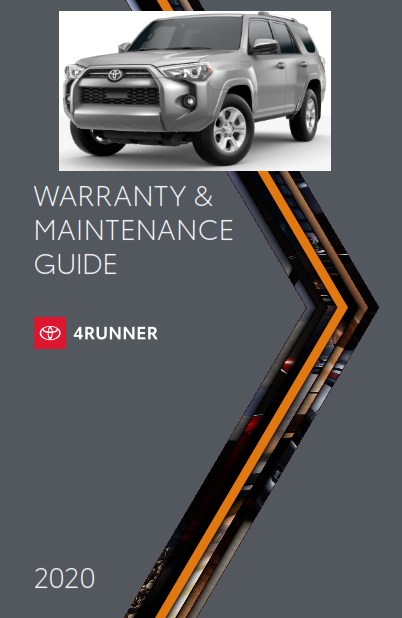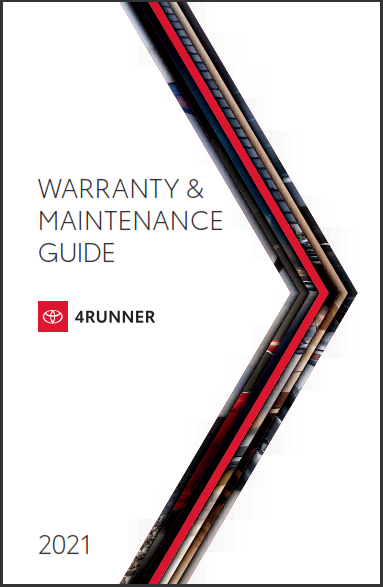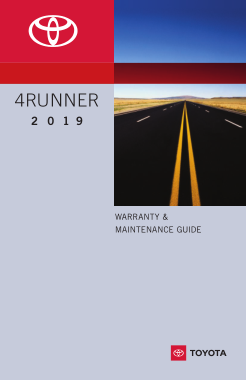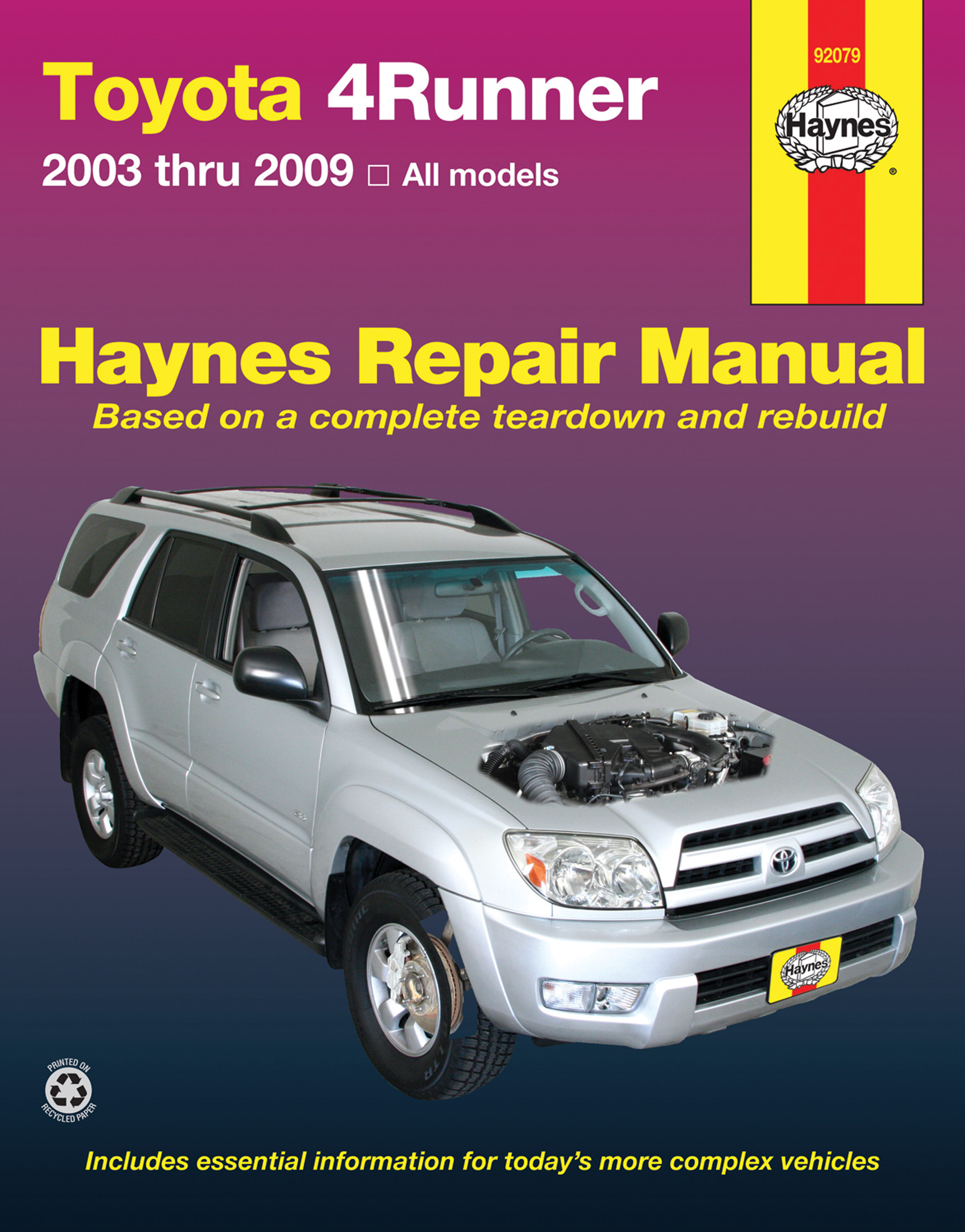Maintaining the Legacy: A Comprehensive Guide to Toyota 4Runner Maintenance
Related Articles: Maintaining the Legacy: A Comprehensive Guide to Toyota 4Runner Maintenance
Introduction
In this auspicious occasion, we are delighted to delve into the intriguing topic related to Maintaining the Legacy: A Comprehensive Guide to Toyota 4Runner Maintenance. Let’s weave interesting information and offer fresh perspectives to the readers.
Table of Content
Maintaining the Legacy: A Comprehensive Guide to Toyota 4Runner Maintenance

The Toyota 4Runner, known for its rugged durability and off-road prowess, is a vehicle that demands respect. Its robust construction and reliable engine are testaments to Toyota’s engineering excellence, but like any machine, it requires consistent care to maintain its peak performance and longevity. This guide delves into a comprehensive maintenance schedule for the Toyota 4Runner, outlining essential steps to ensure your vehicle remains a reliable companion for years to come.
Understanding the Importance of Regular Maintenance
Neglecting regular maintenance can lead to a cascade of issues, ranging from minor inconveniences to major breakdowns. Timely servicing prevents minor problems from escalating into costly repairs. It also ensures optimal fuel efficiency, extends the lifespan of key components, and ultimately enhances the overall driving experience.
The Toyota 4Runner Maintenance Schedule: A Detailed Breakdown
The following schedule provides a comprehensive guide for maintaining your Toyota 4Runner, aligning with the manufacturer’s recommendations and factoring in the unique demands of this vehicle.
1. Regular Oil Changes:
- Frequency: Every 5,000 miles or 6 months, whichever comes first.
- Why: Engine oil lubricates moving parts, reducing friction and wear. Regular changes prevent oil from breaking down and ensure optimal engine performance.
- What to Use: Use the recommended oil type and viscosity specified in your owner’s manual.
2. Air Filter Replacement:
- Frequency: Every 12,000 miles or annually.
- Why: The air filter prevents dust and debris from entering the engine, ensuring clean air intake for optimal combustion.
- What to Use: Replace with a genuine Toyota air filter or a high-quality aftermarket equivalent.
3. Spark Plug Replacement:
- Frequency: Every 30,000 miles or 3 years.
- Why: Spark plugs ignite the air-fuel mixture in the combustion chamber. Worn plugs can lead to misfires, reduced fuel efficiency, and engine damage.
- What to Use: Use the recommended spark plug type and gap specified in your owner’s manual.
4. Fuel Filter Replacement:
- Frequency: Every 30,000 miles or 3 years.
- Why: The fuel filter removes impurities from the fuel, preventing them from reaching the engine and causing damage.
- What to Use: Use a genuine Toyota fuel filter or a high-quality aftermarket equivalent.
5. Coolant Flush and Replacement:
- Frequency: Every 3 years or 30,000 miles.
- Why: Coolant prevents engine overheating by transferring heat away from the engine block. Regular flushes ensure proper cooling system function.
- What to Use: Use the recommended coolant type and mixture specified in your owner’s manual.
6. Brake Pad and Rotor Inspection and Replacement:
- Frequency: Every 12,000 miles or annually.
- Why: Brake pads wear down over time, impacting braking performance. Regular inspections and replacements ensure safe stopping ability.
- What to Use: Use genuine Toyota brake pads and rotors or high-quality aftermarket equivalents.
7. Transmission Fluid Flush and Replacement:
- Frequency: Every 60,000 miles or 5 years.
- Why: Transmission fluid lubricates and cools the transmission, ensuring smooth gear changes. Regular flushes maintain optimal transmission function.
- What to Use: Use the recommended transmission fluid type specified in your owner’s manual.
8. Differential Fluid Replacement:
- Frequency: Every 30,000 miles or 2 years.
- Why: Differential fluid lubricates the gears and bearings in the differential, ensuring smooth power transfer to the wheels.
- What to Use: Use the recommended differential fluid type specified in your owner’s manual.
9. Tire Rotation and Alignment:
- Frequency: Every 5,000 miles or 6 months.
- Why: Tire rotation ensures even wear across all tires, extending their lifespan. Alignment ensures proper tire contact with the road, improving handling and fuel efficiency.
- What to Use: Use the recommended tire pressure specified in your owner’s manual.
10. Battery Inspection and Replacement:
- Frequency: Every 2 years or 24,000 miles.
- Why: Batteries lose their charge capacity over time. Regular inspections and replacements ensure a reliable start.
- What to Use: Use a genuine Toyota battery or a high-quality aftermarket equivalent with the same specifications as the original.
11. Timing Belt Replacement:
- Frequency: Every 90,000 miles or 6 years.
- Why: The timing belt synchronizes the crankshaft and camshaft, ensuring proper valve timing. A worn or broken timing belt can cause catastrophic engine damage.
- What to Use: Use a genuine Toyota timing belt or a high-quality aftermarket equivalent.
12. Regular Inspections:
- Frequency: Every 3,000 miles or 3 months.
- Why: Regular inspections allow for early detection of potential issues, preventing them from escalating into major problems.
- What to Check: Check fluid levels (engine oil, coolant, brake fluid, power steering fluid), tire pressure, belts and hoses, lights, wipers, and overall vehicle condition.
Beyond the Scheduled Maintenance
While the above schedule provides a solid foundation, additional maintenance tasks may be required based on driving conditions, vehicle age, and individual preferences. Consider the following:
- Regular Car Washes: Keep your 4Runner clean to prevent rust and corrosion.
- Undercarriage Cleaning: Regularly clean the undercarriage to remove dirt, grime, and salt, which can accelerate corrosion.
- Interior Cleaning: Keep the interior clean and free of debris to maintain a pleasant driving environment.
- Professional Inspections: Schedule regular professional inspections, especially after any major repairs or modifications.
Frequently Asked Questions
Q: What is the best way to ensure my 4Runner receives the proper maintenance?
A: Adhering to the recommended maintenance schedule is crucial. Additionally, keeping accurate records of all services performed and maintaining a log of any repairs or modifications can provide valuable insights into your vehicle’s history.
Q: Can I perform some of the maintenance myself?
A: Many basic maintenance tasks, such as oil changes and air filter replacements, can be performed at home with the right tools and knowledge. However, more complex procedures like timing belt replacement or transmission fluid flushes are best left to qualified mechanics.
Q: How can I tell if my 4Runner needs a specific service?
A: Pay attention to warning lights on the dashboard, unusual noises or vibrations, and changes in vehicle performance. Consult your owner’s manual for detailed information on specific warning lights and their meanings.
Q: What is the best way to find a reliable mechanic for my 4Runner?
A: Seek recommendations from trusted friends or family members. Check online reviews and forums for feedback on local mechanics. Look for shops specializing in Toyota vehicles or off-road vehicles.
Tips for Maintaining Your Toyota 4Runner
- Use Genuine Toyota Parts: Genuine Toyota parts are designed specifically for your vehicle and offer the best fit and performance.
- Follow the Owner’s Manual: Your owner’s manual contains detailed information on maintenance schedules, recommended fluids, and troubleshooting tips.
- Keep a Maintenance Log: Record all maintenance services performed, including dates, mileage, and any issues encountered.
- Invest in Regular Inspections: Schedule regular professional inspections to catch potential problems early.
- Consider a Service Contract: A service contract can provide peace of mind and financial protection for unexpected repairs.
Conclusion
Maintaining your Toyota 4Runner is an investment in its longevity and performance. By adhering to the recommended maintenance schedule, utilizing genuine Toyota parts, and seeking professional assistance when needed, you can ensure your 4Runner remains a reliable and capable companion for many years to come. Remember, a well-maintained 4Runner is not just a vehicle; it’s a testament to your commitment to responsible ownership and an embodiment of Toyota’s legendary reliability.








Closure
Thus, we hope this article has provided valuable insights into Maintaining the Legacy: A Comprehensive Guide to Toyota 4Runner Maintenance. We hope you find this article informative and beneficial. See you in our next article!